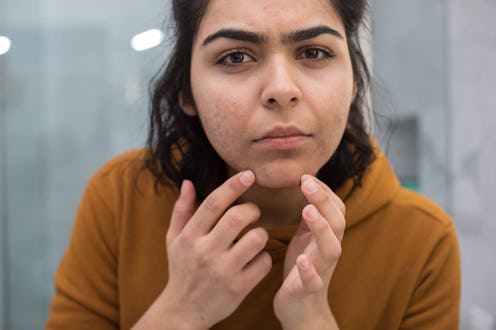Life
7 Reasons Your Adult Acne Isn’t Going Away — And How To Fix It

As a teenager, I’d imagine my 25-year-old self. I’d drive a new BMW, bring in a six-figure salary, and have flawless skin. As I grew older, the desire for a fancy car and copious amounts of money subsided, but I’m still looking forward to the day when acne is a distant memory. Pop culture often portrays acne as an unfortunate but temporary aspect of teenage years; for many people, that’s not the case. Adult acne is a medical condition that impacts more people than you might think. Between 40 and 55 percent of adults have been diagnosed with low grade, persistent acne and oily skin. There are a number of causes of adult acne, and many ways to fix it.
Dr. Philippa Lowe at the Cranley Clinic tells Bustle that while adult acne is common, it’s also very treatable. “We frequently see adult acne in our clinic — mainly in women. This is due to hormonal changes that can be caused by pregnancies, some OCP (oral contraceptive pills), stress — juggling work and families — and general changes in hormone levels that occur naturally with age,” she says. “We treat adult acne in much the same way that we treat teenage acne. If mild or moderate we recommend you use over the counter treatments. If the acne is persistent, moderate or severe then we would advise that you see your GP (general practitioner) or a dermatologist to discuss prescription acne medication. These medications are often used with over the counter products.”
Often, the underlying cause for your adult acne will dictate the best form of treatment. Ahead, you’ll find seven common adult acne causes and suggestions for how to get rid of it for good.
1Stress
Stress can trigger acne by releasing cortisol in the body. Cortisol is a naturally occurring stress-hormone that causes your body to produce pore-clogging oil. You'll want to manage the excess oil production by blotting it and washing your face with a gentle cleanser — an oil cleanser can actually, surprisingly, help.
Then, you'll want to try to eliminate or manage the underlying cause of your stress — though I'll be the first to tell you that isn't always possible. You can try mediating or other forms of self-care to manage your body's reaction to stress, too. If that doesn't help, fight stress-hormones with feel-good hormones to combat your stress-induced acne. Doing jumping jacks, squats, or even running in place will help your body produce more dopamine and serotonin, hormones that make you feel good.
2Hormonal Imbalance
The acne the appears on your face is often a reflection of what’s going on inside your body. Hormonal imbalances, such as high testosterone levels in women or polycystic ovarian syndrome (PCOS), are known to cause adult acne. Adult acne coupled with excessive hair growth and irregular periods can be a sign of a hormonal imbalance that calls for an appointment with your doctor.
The best course of action for this cause of adult acne is medication that will help return your hormones to appropriate levels, such as birth control. Talk to your doctor to see what course of treatment is right for you.
3Getting Your Period
Your period brings about hormonal changes. As such, oil production increases and tends to clog your pores. Try a cleanser that contains salicylic acid to help get rid of existing pimples while you ride out your time of the month.
4Large Pores
Have you noticed that your pores have gotten larger over the years? Stress, sun damage, and smoking are some of the potential causes behind enlarged pores.
If you’ve been exposed to any of the risk factors for large pores, change up your routine to avoid them from now on. Then, grab an over the counter cream with retinol in it. Retinol can help skin cells turn over more quickly, speeding up the healing processes for existing pimples & stopping new zits from forming (in addition to a slew of other skin-boosting benefits).
5Diet
Folks who consume large amounts of dairy daily were found to have 20 percent more acne than folks who didn’t. While you may not be willing to give up cheese just yet, buying organic dairy may help calm your adult acne. The hormones animals are fed may be upsetting your hormone levels and turning into pimples.
6Pollution
You know pollution is bad for the environment, but did you know it’s bad for your face too? Yup. Walking around in pollution adds an extra layer of dirt and debris on your face. You can combat this by wiping off your face with a toner after being outside. And never forget to wash your face before going to sleep.
7Your Skin Type
It’s important to know your skin type when purchasing products for your face. Folks who have oily skin should invest in products that won’t further clog their pores — but contrary to popular belief, this doesn't necessarily mean only using "oil free" products. Rather, look for products that are non-comedogenic (aka, non-blackhead forming). Folks with dry skin will want to try spot treatments, like salicyclic acid, on their acne, but make sure to keep the rest of your face moisturized. People with combination skin — a little dry here, a little oily there — might benefit from multi-masking, aka applying different kinds of masks to different parts of your face depending on your needs.
If you’re an adult with acne, you’re definitely not alone — and there are definitely options to help you treat it. Understanding the underlying causes behind your acne can help you treat it more effectively.